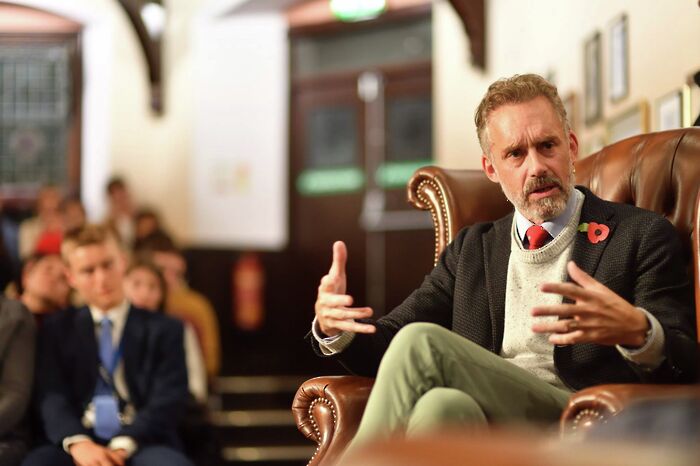Platforming Peterson was not an exercise in free speech, but a legitimation of transphobic ideas
Regardless of intention, the Union and those who attended Peterson’s talk demonstrated a neglect of care for the safety of our fellow students
CN: This article includes references to transphobia and suicide

Trans people in the UK face constant discrimination. In a study conducted by YouGov and Stonewall, 53% of younger trans adults aged 18-24 experienced a hate crime or incident based on their gender identity in 2017. A third of trans university students experienced negative comments or conduct from staff, while one in seven considered dropping out or have dropped out of university. Another British study from 2012 showed that 84% of respondents contemplated suicide, 35% had attempted it, and 25% had done so more than once. It is not too much of a stretch to think that even in liberal Cambridge, trans people you know have faced considerable difficulties that cisgendered people, including myself, cannot even imagine.
This brings us to Jordan Peterson, the Canadian psychologist turned political commentator. Peterson rose to prominence following the controversy surrounding Bill C-16, which added “gender identity or expression” to the Canadian Human Rights code. He criticised this, suggesting that it made not using someone’s preferred pronouns a hate crime, and that it was a threat to freedom of speech. In the view of others though, C-16 did not have such directly implications, including both Brenda Cossman, a Professor of Law at the University of Toronto, as well as Rene Basque, the President of the Canadian Bar Association. While Peterson presents his interpretation as fact, prominent legal scholars condemn him for alleged fear-mongering.
This isn’t the only situation in which Peterson has shown his distaste for using someone’s preferred pronouns. In a debate with Dr. Mary Bryson, a non-binary person who uses they/them pronouns, Peterson repeatedly misgendered Bryson. In an interview with Vice, when asked whether he would comply with a request by a student to address them by their preferred pronouns, he stated that “it would depend on how they asked me”, and that “If I could detect that there was a chip on their shoulder, or that they were [asking me] with political motives, then I would probably say no …”. He also admits that he doesn’t understand the idea that some people do not “fit anywhere on the gender spectrum”. These views show not only a lack of respect to trans people, but they also undermine the validity of non-binary personhood. Last week he was invited to speak at the Cambridge Union.
“Peterson’s appalling views on trans people were legitimised the moment he set foot in the Chamber”
By inviting Peterson to speak, this platform undeniably legitimised him as a political figure, as to the outside world did the fact that the audience represented a portion of one of the world's most prestigious universities' student body. The Cambridge Union was not advocating for the removal of the rights of trans people.
Let us suspend an analysis of freedom of speech and consider the tangible effects of such an invitation. It is one thing to host someone with views which which the audience may strongly disagree. It is an entirely different thing to host someone who poses a threat to the safety and wellbeing of students. In the case of Peterson, this invitation presented a potential and unacceptable threat to the safety and wellbeing of Cambridge’s trans community.
I do not wish to speak for the ways in which Peterson’s popularity at the Union might have affected trans students and members of our University. What I will say, however, is that there are serious questions to be asked here about where the Union’s priorities lie. Peterson, by wilfully misgendering trans people and challenging non-binary identities, ultimately undermines the personhood of many of our University’s members. These were the same ideas that were given space within our University last week.
You might argue that popularity of the event didn’t indicate support for Peterson’s ideas, rather a morbid curiosity or thirst for controversy. But the fact that the Union had to run a ballot for tickets to Peterson’s event in fact shows how many people were willing to ignore the potential implications of giving him such an audience so that they could potentially hear something controversial or get a photo to share on social media. This, to me, is shameful. Peterson's Youtube channel already boasts 1.5 million subscribers and his ideas have earned him extensive news coverage. Why should the Union provide even the possibility of furthering his credibility?
The debate over using someone’s preferred pronouns isn’t a debate between free speech and totalitarian speech controls. Neither is the debate about platforming Peterson. It is a debate about whether non-binary and trans people deserve a level of respect that they shouldn’t have to earn – the same respect automatically given to cisgendered people - and a level of safety within our university that every student should be afforded. By inviting Peterson to the Union and going along to listen to him speak, we all showed our lack of concern for trans students at our University.
 News / Cambridge welcomes UK rejoining the Erasmus scheme20 December 2025
News / Cambridge welcomes UK rejoining the Erasmus scheme20 December 2025 News / CUP announces funding scheme for under-represented academics19 December 2025
News / CUP announces funding scheme for under-represented academics19 December 2025 News / News in Brief: humanoid chatbots, holiday specials, and harmonious scholarships21 December 2025
News / News in Brief: humanoid chatbots, holiday specials, and harmonious scholarships21 December 2025 News / SU reluctantly registers controversial women’s soc18 December 2025
News / SU reluctantly registers controversial women’s soc18 December 2025 News / King appoints Peterhouse chaplain to Westminster Abbey22 December 2025
News / King appoints Peterhouse chaplain to Westminster Abbey22 December 2025









